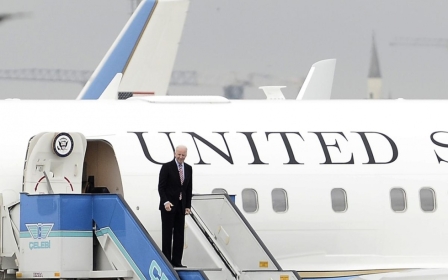Turkey assumes G20 presidency, vows to fight inequality

Turkey on Monday assumed the presidency of the G20 group of major economies for the first time in its history, pledging to battle global inequality during its turn at the helm.
The presidency of the G20 - a grouping of the world's largest economies - is seen by Ankara as a major opportunity for Turkey to showcase its status as an economic and political power under the rule of President Recep Tayyip Erdogan.
"Three words will guide Turkey... inclusivity, implementation and investment," Deputy Prime Minister Ali Babacan told a press conference in Ankara in televised comments.
"We aim to make the G20 reach out to low income countries and take care of countries that are not G20 members in an inclusive way," Babacan said.
"Turkey will bridge the gap between developed economies and undeveloped countries to fight global inequality," he added, vowing to include poor countries in decision-making.
Turkey took over the presidency of the G20 group of developed and major developing economic countries from Australia. China is preparing to take over the presidency for 2016.
Babacan said the 2015 G20 leaders' summit, to be held in November in the southern resort city of Antalya, will discuss topics including "strong, sustainable and balanced economic growth", climate change, global development and the fight against corruption.
"Hosting the G20 summit in 2015 is a big opportunity and a big responsibility for Turkey," he said.
Babacan noted that global unemployment all over the world is still a major problem and the G20 would prioritise the "most vulnerable segments of society".
In October Turkey failed to secure a place on the UN's Security Council.
During Turkey's bid for the place President Recep Tayyip Erdogan criticised the structure of the UN, in particular the power that rests in the five permanent members of the Security Council.
"The world is bigger than five,” Erdogan said late last month in reference to the permanent five.
"The fate of a country should not be in the hands of the US, France, Russia, China or the UK," he added in reference to UN-mandated international intervention in Syria, which has been repeatedly blocked by Russia and China.
Erdogan has called for the formation of a rotating system which would allow 193 member countries to all be represented at the Council.
Erdogan - who became president in August after over a decade as prime minister - wants Turkey to be among the globe's top 10 economies by 2023 when it celebrates its 100th anniversary of the founding of the modern republic.
The president has been credited with turning around the Turkish economy, with GDP per capita almost doubling since he came to power.
But chaos in neighbouring Syria and Iraq, where Islamic militants have seized swathes of territory, a pullback in liquidity by US Federal Reserve and the fragile economic recovery in Europe have hurt Turkey's growth more recently.
Growth slowed sharply to 2.1 percent in the second quarter, official data showed in October.
Stay informed with MEE's newsletters
Sign up to get the latest alerts, insights and analysis, starting with Turkey Unpacked
Middle East Eye delivers independent and unrivalled coverage and analysis of the Middle East, North Africa and beyond. To learn more about republishing this content and the associated fees, please fill out this form. More about MEE can be found here.




